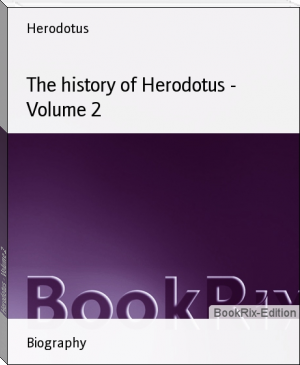The history of Herodotus - Volume 2 - Herodotus (manga ereader txt) 📗

- Author: Herodotus
Book online «The history of Herodotus - Volume 2 - Herodotus (manga ereader txt) 📗». Author Herodotus
corruption of text.
94. {tous irenas}. Spartans between twenty and thirty years old were
so called. The MSS. have {ireas}.
95. {proxeinon}.
96. "fill up more calamities," cp. v. 4.
97. {es antilogien}.
98. {antilogies kuresein}.
99. {ten mesogaian tamnon tes odou}, cp. vii. 124. The expression
seems almost equivalent to {tamnon ten mesen odon}, apart from any
question of inland or coast roads.
100. {limo sustantas kai kamato}, "having struggled with hunger and
fatigue."
101. {autos}: some MSS. read {outos}. If the text is right, it means
Artabazos as distinguished from his troops.
102. i.e. "leader of the army."
102a. {en to Ionio kolpo}.
103. Stein reads {para Khona potamon}, "by the river Chon," a
conjecture derived from Theognostus.
104. It is thought by some Editors that "the prophets" just above, and
these words, "and they told them," are interpolated.
105. {emphuton mantiken}, as opposed to the {entekhnos mantike}
possessed for example by Melampus, cp. ii. 49.
106. Or possibly "Calamoi."
107. i.e. 60,000.
107a. {ton Potneion}, i.e. either the Eumenides or Demeter and
Persephone.
108. {apistous toisi Ellesi}. Perhaps the last two words are to be
rejected, and {apistous} to be taken in its usual sense,
"distrusted"; cp. viii. 22.
109. {neokhmon an ti poieein}.
110. {pheme eseptato}.
111. {eteralkea}, cp. viii. 11.
112. {ton Perseon}: perhaps we should read {ek ton Perseon},
"appointed by the Persians to guard the passes."
113. {ti neokhmon poieoien}.
114. {ten kephalen smatai}: the meaning is uncertain.
115. {Pou de kou me apolesas}: some Editors read {ko} for {kou} (by
conjecture), and print the clause as a statement instead of a
question, "not yet hast thou caused by ruin."
116. {en to aduto}.
117. {aphuktos}: many Editors adopt the reading {aphulakto} from
inferior MSS., "they fell upon him when he was, as one may say,
off his guard."
118. {estergon ta pareonta}.
119. {ekpheugonta}: many Editors have {ekphugonta}, "after he had
escaped."
120. {tarikhos eon}. The word {tarikhos} suggests the idea of human
bodies embalmed, as well as of dried or salted meat.
121. {oi}: some Editors approve the conjecture {moi}, "impose upon
myself this penalty."
122. {sanidas}: some read by conjecture {sanidi}, or {pros sanida}:
cp. vii. 33.
123. Or, "when he had heard this, although he did not admire the
proposal, yet bade them do so if they would."
Imprint
94. {tous irenas}. Spartans between twenty and thirty years old were
so called. The MSS. have {ireas}.
95. {proxeinon}.
96. "fill up more calamities," cp. v. 4.
97. {es antilogien}.
98. {antilogies kuresein}.
99. {ten mesogaian tamnon tes odou}, cp. vii. 124. The expression
seems almost equivalent to {tamnon ten mesen odon}, apart from any
question of inland or coast roads.
100. {limo sustantas kai kamato}, "having struggled with hunger and
fatigue."
101. {autos}: some MSS. read {outos}. If the text is right, it means
Artabazos as distinguished from his troops.
102. i.e. "leader of the army."
102a. {en to Ionio kolpo}.
103. Stein reads {para Khona potamon}, "by the river Chon," a
conjecture derived from Theognostus.
104. It is thought by some Editors that "the prophets" just above, and
these words, "and they told them," are interpolated.
105. {emphuton mantiken}, as opposed to the {entekhnos mantike}
possessed for example by Melampus, cp. ii. 49.
106. Or possibly "Calamoi."
107. i.e. 60,000.
107a. {ton Potneion}, i.e. either the Eumenides or Demeter and
Persephone.
108. {apistous toisi Ellesi}. Perhaps the last two words are to be
rejected, and {apistous} to be taken in its usual sense,
"distrusted"; cp. viii. 22.
109. {neokhmon an ti poieein}.
110. {pheme eseptato}.
111. {eteralkea}, cp. viii. 11.
112. {ton Perseon}: perhaps we should read {ek ton Perseon},
"appointed by the Persians to guard the passes."
113. {ti neokhmon poieoien}.
114. {ten kephalen smatai}: the meaning is uncertain.
115. {Pou de kou me apolesas}: some Editors read {ko} for {kou} (by
conjecture), and print the clause as a statement instead of a
question, "not yet hast thou caused by ruin."
116. {en to aduto}.
117. {aphuktos}: many Editors adopt the reading {aphulakto} from
inferior MSS., "they fell upon him when he was, as one may say,
off his guard."
118. {estergon ta pareonta}.
119. {ekpheugonta}: many Editors have {ekphugonta}, "after he had
escaped."
120. {tarikhos eon}. The word {tarikhos} suggests the idea of human
bodies embalmed, as well as of dried or salted meat.
121. {oi}: some Editors approve the conjecture {moi}, "impose upon
myself this penalty."
122. {sanidas}: some read by conjecture {sanidi}, or {pros sanida}:
cp. vii. 33.
123. Or, "when he had heard this, although he did not admire the
proposal, yet bade them do so if they would."
Imprint
Publication Date: 05-20-2008
All Rights Reserved
Dedication:
Translator George Campbell Macaulay
Free e-book «The history of Herodotus - Volume 2 - Herodotus (manga ereader txt) 📗» - read online now
Similar e-books:





Comments (0)